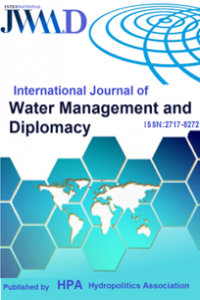Abstract
References
- World Economic Forum ‘The global risks Report 2020” 15th Edition.
- Council of the European Union, ’Council Conclusions on Water Diplomacy’, Brussels 19 November 2018. https://www.consilium.europa.eu/en/press/press-releases/2018/11/19/water-diplomacy-council-adopts-conclusions/
- UN WATER, SDG 6 Synthesis Report 2018 on Water and Sanitation, July 2018
- UN and World Bank High-Level Panel on Water projects.
Abstract
Water is essential for life. With increasing water demand due to population growth and the growing impact of climate change, water scarcity affects a quarter of the world’s population and is growing. Water crises are recognized as one of the 5 major global risks by the World Economic Forum . In this scenario, it becomes essential to ensure effective cooperation between countries in the management of water resources.
Tensions and conflicts over access to water continue to rise, as the world’s water resources and ecosystems deteriorate, and the threat of water scarcity spreads. 36% of the world’s people live in water-scarce regions. Today billions of people still lack access to safe drinking water and sanitation and most of them live in fragile and violent regions.
In order to address these challenges, the Council of Foreign Affairs of the EU adopted Conclusions on Water Diplomacy on 19 November 2018 which recognized the potential of water scarcity to affect peace and security and announced the EU intention to enhance its diplomatic engagement on water. Through its water diplomacy, the EU aims at supporting peace, sustainable development, respect to human rights and a rules-based multilateral system.
The Council Conclusions of 2018 updated the previous ones of 2013 and developed a new approach to water in a post-2015 world, which reflects increasing new challenges such as climate change and links water to security. The Council recalled that water is a prerequisite for human survival and dignity and a fundamental basis for the resilience of both societies and the environment.
This article reviews the EU approach to water diplomacy, as outlined in these Council Conclusions, which reflect the EU's readiness to support international cooperation, prevent conflict and encourage negotiated solutions ensuring a fair and sustainable management of water resources for the benefit of human dignity and peace.
References
- World Economic Forum ‘The global risks Report 2020” 15th Edition.
- Council of the European Union, ’Council Conclusions on Water Diplomacy’, Brussels 19 November 2018. https://www.consilium.europa.eu/en/press/press-releases/2018/11/19/water-diplomacy-council-adopts-conclusions/
- UN WATER, SDG 6 Synthesis Report 2018 on Water and Sanitation, July 2018
- UN and World Bank High-Level Panel on Water projects.
Details
| Primary Language | English |
|---|---|
| Subjects | International Relations |
| Journal Section | Research Articles |
| Authors | |
| Publication Date | June 15, 2020 |
| Published in Issue | Year 2020 Volume: 1 Issue: 1 |
.png)
.png)

